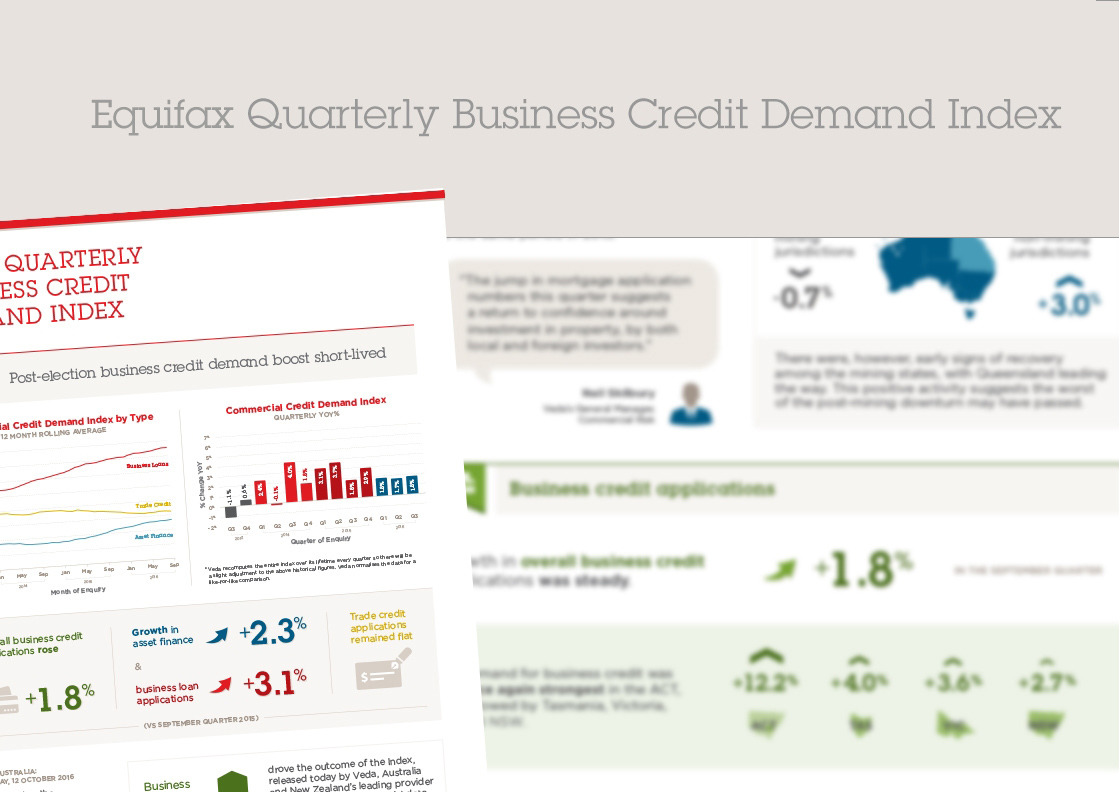Flat growth for business credit in Q4

Veda Quarterly Business Credit Demand Index: December 2013
Flat growth for business credit in Q4 of 2013
- Overall business credit growth increased by +0.9%, slight rise from -0.7% in September quarter
- Asset finance enquiries fall by -5%, second consecutive quarter of reduced demand
- Western Australia data shows mining slowdown continues to bite as demand for business loans, asset finance and trade credit contracts
Sydney, 16 January, 2014: Veda, the data analytics company and leading provider of credit information and analysis in Australia and New Zealand, today revealed the results of its business credit demand index for the fourth calendar quarter of 2013. The index, which measures the change in credit demand for the December quarter compared to the same period in 2012, showed that overall business credit demand rose by +0.9% over the past year, and increased marginally from -0.7% in the September quarter.
The modest rise in overall business credit enquiries reflects an increase in business loans (+5.2%), a small rise in trade credit (+1.2%), and a fall in asset finance enquiries (-5.0%).
Growth in business credit enquiries across the non-mining states picked up slightly to +1.7% in the December quarter, up from -0.1% in the previous quarter. Business credit enquiries in the mining states of WA, QLD and NT were more subdued, demonstrating a contraction of -0.6% in the December quarter, up from -2.1% in September. Weakness in business credit is now clearly showing in WA, where business credit applications fell by -5.2% over the past year.
“The latest data suggests that demand for credit remains flat, with the downturn in Australia’s resources sector and generally weak business conditions taking their toll on businesses confidence, despite low interest rates, clarity on the Federal government and a lower Australian dollar,” said Moses Samaha, general manager of commercial credit risk at Veda.
Overall business credit enquiries picked up slightly in the December quarter with NSW (+1.9%), VIC (+1.6%) and QLD (+1.5%) experiencing moderate growth. Enquiries were highest in the NT (+8.4%), ACT (+6.6%) and TAS (+4.5%), while WA (-5.2%) had the weakest business credit conditions, followed by SA (-1.3%).
The strongest growth in business loan enquiries in the December quarter was seen in NSW (+8.8%), followed by SA (+6.6%), QLD (+6.4%), VIC (+5.5%), ACT (+5.4%) and the NT (+2.2%). Demand for business loans fell for the second consecutive quarter in WA (-5.7%), while demand also contracted in TAS (-4.9%).
Within overall business loan enquiries, commercial mortgage applications (+37%) demonstrated strong growth due to low interest rates, while moderate growth of 5% was seen for lending proposals and overdrafts and demand for commercial credit cards contracted (-18%). Reflecting the strength being seen in mortgage applications, business loan enquiries have increased over the past year in the finance and insurance industry, as well as the property services industry.
Growth in trade credit enquiries remained relatively weak in the December quarter, but recorded a stronger performance compared to the September quarter. The NT (+19.9%) demonstrated the strongest demand for trade credit, along with TAS (+13.1%), ACT (+6.2%) and QLD (+4.8%). Victoria recorded moderate growth (+2.6%) while decreases were recorded in NSW (-0.8%), WA (-0.7%) and SA (-9.0%).
A fall in trade credit enquiries was recorded over the past year in the mining industry, as well as the agricultural and accommodation and food services industries.
Asset finance enquiries continued to be weak in the December quarter due to reduced demand in the mining states with WA (-11.1%), QLD (-8.3%), and the NT (-1.1%) recording contractions. Across the non-mining states, NSW (-2.8%), VIC (-4.8%), SA (-0.5%) demonstrated weakness, while TAS (+6.5%) and the ACT (+8.7%) recorded increases.
In addition to the downturn in asset finance enquiries in the mining states, decreases were also evident in public administration and education, although an increase in asset finance enquiries was recorded in the utilities sector.
“There has not been a full rectification of the contraction caused by the prior government’s FBT rule changes last July. Asset finance growth has also been impacted by reduced activity in the mining states.”
Veda’s Business Credit Demand Index has historically proven to be a good indicator of how the overall economy is faring, with movements in the index correlating with growth in real GDP.
“The latest data suggests that the annual growth rate of GDP will run at around 2.5% per annum, which is similar to the rate of 2.3% recorded in the year to the September quarter of 2013.”
NOTE TO EDITORS
The business credit demand index measures the volume of credit enquiries that go through the Veda Commercial Bureau by credit providers such as financial institutions and major corporations in Australia. Based on this it is a good measure of intentions to acquire credit by businesses. This differs to other market measures published by the RBA/ABS, which measure new and cumulative dollar amounts that are actually approved by financial institutions.
DISCLAIMER Purpose of Veda Indices releases: Veda Indices releases are intended as a contemporary contribution to data and commentary in relation to credit activity in the Australian economy. The information in this release does not constitute legal, accounting or other professional financial advice. The information may change and Veda does not guarantee its currency, accuracy or completeness, and you should rely on your own analysis and enquiries. Veda has relied on third party information in compiling the Indices and has not been able to independently verify the accuracy of that information. To the extent permitted by law, Veda specifically excludes all liability or responsibility for any loss or damage arising out of reliance on information in this release and the data in this report, including any consequential or indirect loss, loss of profit, loss of revenue or loss of business opportunity.
